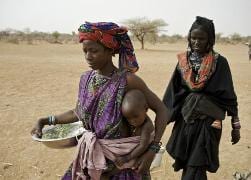Millions of people in West Africa could be protected from a serious food crisis if preparations are scaled up across West Africa, Oxfam said today. With early indicators pointing to a likely food crisis in 2012 – and a particularly high risk in Mauritania, Niger, Burkina Faso, Mali and Chad – now is the time to invest in preventative measures.
Millions of people in West Africa could be protected from a serious food crisis if preparations are scaled up across West Africa, Oxfam said today. With early indicators pointing to a likely food crisis in 2012 – and a particularly high risk in Mauritania, Niger, Burkina Faso, Mali and Chad – now is the time to invest in preventative measures.
 |
| West Africa crisis 2010: The villagers of Timbouloulag were forced to supplement their diet with leaves collected from the bush. |
Governments across the region, who have already recognised the seriousness of the coming crisis, should scale up efforts to make sure people have money to buy food, receive animal feed for their livestock and emergency food is stocked and ready to be distributed.
Mamadou Biteye, Oxfam Humanitarian Lead in West Africa, said:
“The situation is looking extremely worrying for millions of people in West Africa, but the worst is not yet inevitable. The crisis has been identified early and we know there are cost-effective measures that can be taken now to protect those most vulnerable. This time we can act before the emergency hits.”
Early warning systems have identified a range of factors that are contributing to the coming crisis. Low rainfall and water levels, poor harvests and lack of pasture, high food prices and a drop in remittances from migrants are all causing serious problems.
According to national early warning systems, cereal production is down compared to the five-year average, with Mauritania and Chad showing deficits of over 50 per cent compared to last year. National food reserves are dangerously low and prices of some key cereals are up to 40 per cent higher than the five-year average.
Evaluations are still ongoing to identify those at most risk but early reports suggest six million people in Niger and 2.9 million people in Mali live in areas vulnerable to the coming crisis, while in Mauritania, 700,000 people – over one-quarter of the population – are reported to be at-risk of severe food insecurity. In Burkina Faso, official estimates are yet to be released but are likely to show over two million people are at risk. In Chad, 13 out of 22 regions could be affected by food insecurity.
The last food crisis in the Sahel region, in 2010, affected 10 million people.
Biteye added: “People are still recovering from the last crisis in 2010 and are incredibly vulnerable to any extra shocks such as rising food prices, poor harvests or the death of their animals. These people need help now to build resilience before next year. Acting early could make a huge difference.”
Oxfam is gearing up its work to immediately address the needs of the most vulnerable people. The agency is working in some of the affected areas helping communities to increase resilience to the coming crisis, and getting ready to provide food assistance. For example, in the Gorgol region of Mauritania, 1300 women – as part of cooperatives – are benefiting from irrigation systems pumping river water for vegetable gardens. In Burkina Faso, Oxfam has already started responding, with the support of ECHO, to help 50,000 people access food.
Whilst an early response is crucial to protect people in 2012, Oxfam warned that preventing future crises would require action to address root causes and provide longer-term support for the poorest people in a region where 300,000 children already die from malnutrition-related diseases in ‘non-crisis’ years.



